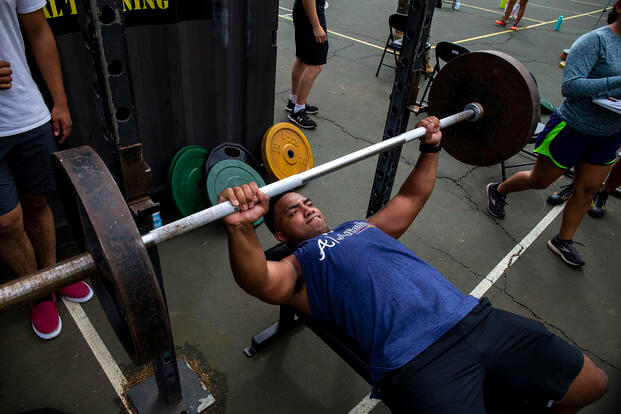When done properly, weightlifting can build muscle, improve fitness and promote an overall healthier lifestyle. However, if done improperly, it could lead to serious long-term injury.
"There are a lot of aspects to weightlifting safety, but the main injuries are back injuries and muscle tears," said Tech. Sgt. Hussein Hamdan, 39th Force Support Squadron fitness center operations manager, "and that comes from people not using proper weightlifting techniques."
Most people get started by following the examples of their friends, as opposed to getting assistance from fitness center personnel, and that can lead to bad habits that may cause injury.
"They watch other people at the gym lift. They don't have proper training or guidance from certified trainers. They don't usually ask us for assistance," Hamdan said. "They come with one of their buddies and just start working out. Maybe they spot each other. Maybe sometimes they fail to spot each other, and that can result in some of the injuries.
"All of our staff is trained on the use of equipment, so if a customer has any questions, they can come ask us. We have programs, and we have a system to track your programs."
When lifting, having a spotter around to ensure you perform the exercise properly and not dropping the weights is crucial, because even the most experienced weightlifters can hurt themselves.
"With free weights, we prefer you have a spotter because we're all humans and something could go wrong," added Hamdan. "A spotter is helpful because most people have one side of their body that is stronger; so when using free weights, the spotter can make sure you're keeping the weight balanced and not tipping it to one side."
Back injuries are a leading cause of lost time among weightlifters. The back could become injured for various reasons, including improper technique, not being worked out enough or mishandling weights.
"With free weights, the closer you are to the weight, the better it is for your back," said Hamdan. "For example, if you have a 20-pound weight on the ground and you lift it properly from 10 inches away from it, that puts 170 pounds of pressure on your back. Under the same circumstances, if you are 20 inches away, the weights would put 250 pounds of pressure. Over time, all that pressure can do damage to your back. So when you lift a weight, you want to get close to it, get square, kneel down and lift it with your legs."
Most injuries can be prevented by setting realistic goals and knowing your limits, according to Hamdan.
"What people do is, they go in thinking, 'I want to gain some muscle weight,' or 'I want to go in there and just get bigger, so let me use some supplements and lift as much as I can,'" Hamdan said.
"That leads to muscle-tear injuries because when you use supplements, you feel stronger, you feel like you can lift more weight; but what they don't realize is afterwards, when that feeling goes away and they're out of energy and out of power, they're going to start feeling the pain because they've overworked their muscles."
Hamdan added that it is important to know that results wouldn't happen overnight. Overworking muscles can set lifters back, because it takes away from recovery time.
"A lot of people think if they work out two or three times a day, they will get better results. That is not the case," he said. "The body needs time to recover, and that's when your muscles actually grow. I see people who use supplements, and they'll come work out in the morning, then again on their lunch break and then for a third time after work, because they feel like with the supplements, they have enough energy to lift the weight; but they're not allowing their body time to recover from their workout."
Proper breathing assists the lifter by oxidizing the blood being circulated to the muscles, and it also will help to prevent hernias.
"Breathing is very important when you lift weights. A lot of people hold their breath, because they feel like building that pressure inside will help them get a better thrust; but if you don't breathe, all that air builds up and it needs to find a way to escape," said Hamdan. "That's when hernias happen, because that's the weakest point in your body while lifting heavy weight."
Weightlifting is only one method to build muscle, and the fitness center offers several alternatives.
"For people who don't prefer to use free weights, we have resistance bands and medicine balls you can work out with. We also have 'selectorized' machines. Each machine has the information about how to use it and how to position your body on it posted. With that, you don't have to worry about picking up the weight or putting on the machine properly. You just select a weight and do your reps."
There are several agencies around base, where people can go to get detailed information about various aspects of working out.
"Every Air Force fitness center has a trained staff," Hamdan said. "You can go to the Health and Wellness Center and talk to a dietician. The HAWC also offers specialists who can help them with various aspects of running and working out. You can also go to a physical therapist, and they can go in depth with you so you don't overextend your joints or muscles."
Related articles:
Want to Learn More About Military Life?
Whether you're thinking of joining the military, looking for fitness and basic training tips, or keeping up with military life and benefits, Military.com has you covered. Subscribe to Military.com to have military news, updates and resources delivered directly to your inbox.

















